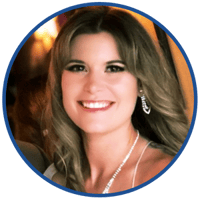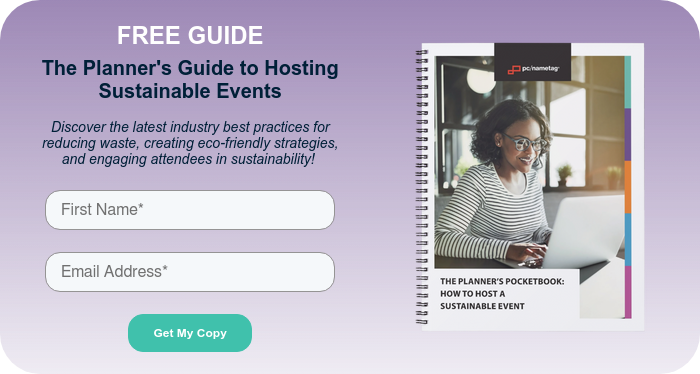It’s no secret that the events industry changes every day. Trends come and go, new challenges arise, and event professionals continue to step up to the plate to create meetings that make an impact.
We love that event planners are known for thinking on the fly and rolling with the punches. Yet, change can be scary for anyone, especially when we're challenged to take creative risks or try things we’ve never done before.
Is there danger in resisting change when it comes to event planning processes and using new technology? According to Cynthia Olsen and Jaeryn Smith, the answer is yes. Read on to learn what two event management degree program graduates had to share about incoming event planners and their passion for driving innovation in the industry.
- Reader’s Note: This article is the second installment in a series. Read “How to Bridge the Event Planning Generation Gap” to discover perspectives from a CMP with 25+ years of experience.
 |
 |
|
Cynthia Olsen Events Professional and Interviewee |
Jaeryn Smith Events Professional and Interviewee |
Ask Me Anything: Event Management Degree Program Grads
pc/nametag: “What inspired you to pursue an event planning career?”
Olsen: “When I was majoring in Business Management at Appalachian State University, a professor of mine asked if I was interested in interviewing for an Event Coordinator position for the Appalachian Energy Summit. This is an energy conference that they host every summer that focuses on sustainability and renewability.
While I did not have a background in event management at the time, I got the job. It was the perfect balance of guidance and freedom, which made me fall in love with executing events. Getting people together and creating hype around the conference inspired me to pursue my Event Management Degree with Madison College. I knew this was exactly what I wanted to do.”
Smith: “In 2013, I participated in the Culinary Program at Madison College because I loved the idea of bringing people together over food. However, I quickly realized that cooking was something I prefer to do at home. I wanted to work with people in a management role, but I also didn’t want to be stuck in the kitchen my whole life.
About eight years later, I stumbled upon the Event Management program at Madison College. A good friend of mine said ‘You really like events, and you really like managing people, so why not put those two things together?’ I have always had a passion for helping people create memories and the program was only two years, so I enrolled and instantly fell in love."

PCN: “What essential skills should every event professional have?”
Olsen: “Every event professional needs an interest in human connections and shared experiences. Understanding how people think, feel and operate can help you create organic, memorable experiences. I have always enjoyed learning the behavioral and psychological side of the industry and how to implement those aspects into event design.”
Smith: “Events have countless moving parts, so having the ability to multitask, stay exceptionally organized, and keep close attention to detail is a must. You also need to be a people person. You are going to work with all types of people who are going to rely on you as a point of contact, so it’s important to stay professional and keep a level head.
Next, you need a willingness to learn. No event is the same. The people you work with also won’t be the same, so it’s up to you to determine how you are going to work effectively in a certain space, within certain parameters, with certain people. Always think on your feet and remain approachable to the people around you.”

PCN: “How are new event professionals creating positive change and challenging the status quo?”
Olsen: “New event professionals are bringing a lot of attention to technology and sustainability. Many of them are from a generation that was brought up on rapid technological advancements, from video games to virtual reality, augmented reality and different social media platforms. There are so many opportunities today to make experiences more unique, accessible and engaging through technology.
Sustainability is also huge. It is imperative that we start slowing down—or even reversing—the damage we have had on the environment. Today’s event professionals are more concerned about their event’s carbon footprint, recycling protocols and waste reduction programs than ever before. Plus, event sustainability is a great opportunity to boast a bit to shareholders and the public. If you do well and meet (or exceed) your sustainability goals, make it known.”
Smith: “New event planners are passionate about using tools and technology to increase efficiency. One time, I was working with a friend of mine who has a business. He was making all his maps on Canva using shapes. That is so much work compared to using a diagramming program like SocialTables. My classes showed me so many useful tools just like this to save time.
I believe event planning students are coming out of Event Management programs with a huge leg up compared to people who are trying to break into the industry on their own. Madison College’s program gave me a formal educational background filled with useful resources, unique perspectives and new ideas that will bring freshness to the industry.”

PCN: “What event planning challenges might new professionals face as they navigate the industry?”
Olsen: “I have experienced some pushback on cutting-edge ideas like virtual reality and hybrid experiences. Many people in senior roles have always done things a traditional way. They have seen success with these processes, which makes it difficult to sway them into trying something different.
While this is understandable, this reticence can be a frustration for new and incoming event professionals as they navigate the industry. We are passionate about creating new ‘this-is-how-things-have-always-been-done' moments.
I believe the key to getting stakeholders on board with trying new things is a combination of charisma and showing them the numbers. Provide evidence that an idea has been implemented elsewhere, then demonstrate how that company saw growth. Did they generate more income? Increase attendance? Exhibit more learning retention? Statistics, ROI, and social proof are key to your success.”
Smith: “First, getting experience is hard for some students. I have found that companies are looking for specific experience. I have two jobs on my resume as an event professional, but I have gotten to the final rounds of interviews and been overlooked because I have not worked on the weddings side of the industry. It is difficult to get experience when employers don’t give new planners a chance.
Second, I have also found that some employers are looking for bachelor's degrees. I have an associate degree, but I did not find my education any less valuable than a four-year degree. Personally, I felt like my program was extremely focused on getting me the education I needed without unnecessary filler.
Lastly, inclusion and acceptance in the industry can be a challenge. I have colored hair and several tattoos, and I have been overlooked after many great interviews because of the way that I look. I am hoping to change that for other people in the industry to ensure that it is not a challenge they need to overcome.
If you look at my resume, it is solid. That is why I want to encourage people to open their mindset. If you can tell that I am professional, have the skills and experience, and know what I am talking about, I want that to be enough. My hair and tattoos do not affect my quality of work. In fact, it can even open conversation! This is a stereotype that needs to be reevaluated. Event professionals should have the freedom to be themselves without needing to look a certain way."

PCN: “What are the biggest things experienced event planners can teach new event planners?”
Olsen: “I enjoy learning from people who are very cutting-edge, open-minded and willing to learn and absorb ideas from all walks of life. It is not about experienced planners always getting their way or newer planners always getting their way. All planners need to make a goal of learning and absorbing new information and material to incorporate it into their event strategy.
It can be difficult to challenge yourself to not be stagnant, especially if you’ve always done things a certain way. But what if you did try something different? What if it works even better? The more experienced planners I’ve worked with have been very open-minded.”
Smith: “I enjoyed learning from all the thought leaders that Janet Sperstad, CMP, brought into our classes. Everyone was amazing and eager to connect with me on LinkedIn. Having those connections early on in my career has helped me stay in touch and learn new things.
There was one person I connected with who took time out of her day to review my resume and give me pointers. I was beyond impressed that she remembered me from classes, reached out to me personally and was willing to help me grow as a professional. She gave me real, honest advice about my resume. It was awesome.
This industry is full of great people like that. If everyone tries to share their knowledge and experience with others, we can make this industry all the stronger. I can learn something from you, but we can also tweak it and make it better together.”

PCN: “What event planning classes or subjects most resonated with you? Why?”
Olsen: “Meeting design really resonated with me because it incorporates human behavior elements in a functional way. For example, consider your space. How will you space out tables and chairs to make sure nobody is cramped or uncomfortable? You also don’t want to space everyone too far apart, or you run the risk of impeding connections.
There really is a sweet spot when it comes to figuring out event floor plans and set-up. You must determine how to best facilitate those ‘collaborative moments’ among attendees.”
Smith: “Because we learned so much in our classes, I am still discovering what direction I want to go in the industry. Exhibitions resonated with me. Seeing an empty room turn into a small city for several days is an indescribable experience.
A green meetings class was also included in my program. It was a short, 6-week class that talked about the impact and importance of event sustainability. That class challenged me to think about how I can make eco-friendly choices in my everyday life as well, not just on an event planning level."

PCN: “If someone was interested in pursuing an event management degree, what would you say to them?”
Olsen: “You will never know if you don’t try. In life, you will give yourself different opportunities to try new things and discover what resonates with you. And yes, there will be some failures along the way. But if you never push yourself out of your comfort zone, you may not be where you are now. Give it a shot even if you don’t have experience. Take a class or two and see if you really shine there. Pursue your dreams.”
Smith: “The program was hard, but incredibly rewarding. The events industry is one that will take you places and is never static. You will meet countless people who will teach you diverse perspectives not just within the industry, but also about life and the world.
The Event Management degree program at Madison college provides hands-on education that is well executed. One of my favorite parts was getting involved in associations like International Association of Exhibitions and Events (IAEE) and Meeting Professionals International (MPI). I also obtained many certifications through the program, including from HubSpot and IAEE.
Lastly, I always felt like my teachers found opportunities for us to learn—either from each other or from guest speakers. For example, Janet got us into the IMEX-MPI-MCI Future Leaders Forum. That included people from all over the world! I found all these educational experiences to be the most impactful parts at Madison College. My teachers changed my perspective on school. Even ‘dryer’ subjects were intriguing and useful.”
Your Event Planning Degree Starts at Madison College
Whether you are looking to kickstart your career or grow in your skillset, the Event Management Associate Degree Program at Madison College is the perfect place to start. This program is built to provide the knowledge you need to build real-world skills and gain a competitive advantage in the market. Learn from leading industry experts about the following:
|
|
To view the full curriculum, tuition costs, or apply for admission, visit the Event Management Program Page on Madison College’s website.

Create an Innovation Culture in the Events Industry
Many event professionals pride themselves in staying ahead of industry trends and finding new ways to improve the event experience. The following resources will help you become more efficient and grow in your career, no matter your level of experience:
- Subscribe to the Tag Talk Blog: Get the latest tips and trends in the meetings and events industry delivered straight to your inbox. From event design tips to green meeting ideas, you will find something useful here.
- Take a Continuing Education Course: It is never too late to become a life-long learner. Find the perfect website to help you supplement your existing education or learn a new skill for your career.
- Use Productivity Hacks to Get More Done: Find new strategies to help your team save time, money, and resources so you can focus on preparing meetings that make an impact.
- Sharpen Your Project Management Skills: Be the best leader you can be and deliver projects that make your team proud with our best tips and advice for successful project managers.
What tools or resources have you used to grow in your career as an event professional? Let us know by leaving a comment below. If it is useful to you, it will be useful to others as well!




Submit a Comment